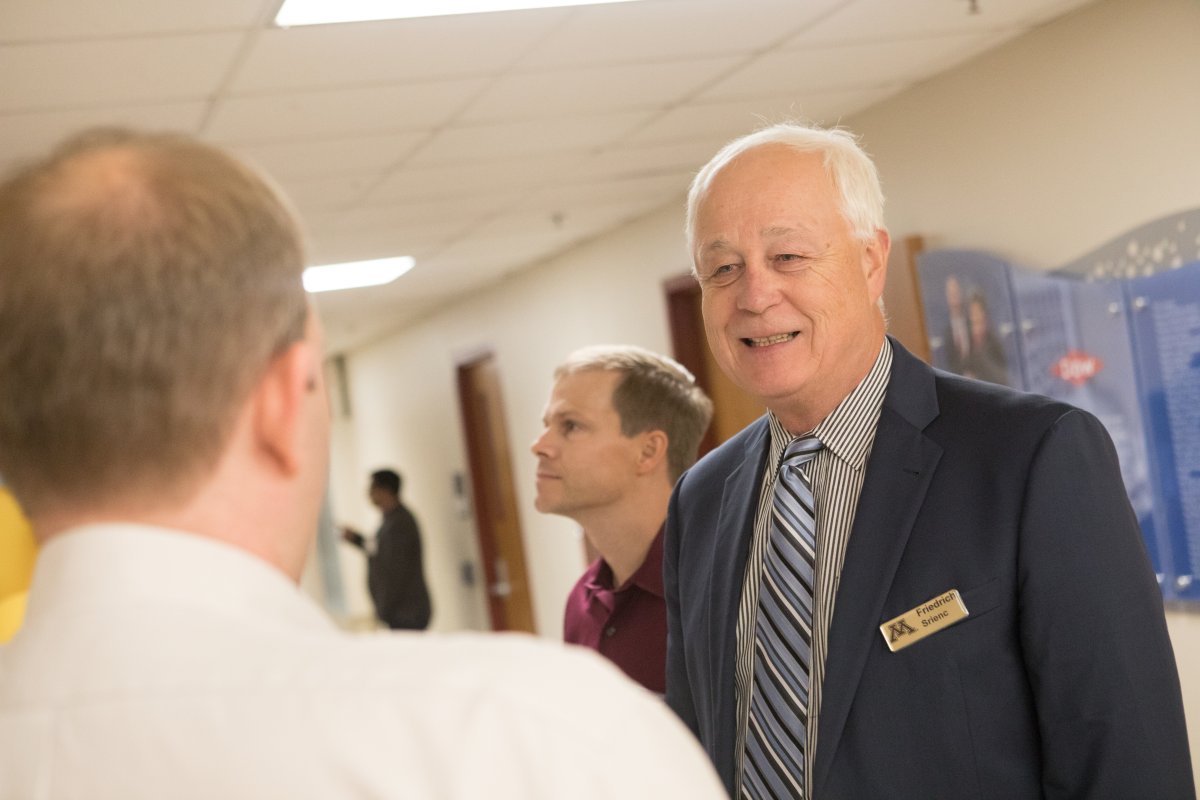FRIEDRICH SRIENC
PROFESSOR
Research Interests
To exploit the full potential of biotechnology it is necessary to have a quantitative understanding of the cell behavior and of the interactions of individual cell components which cause a cell to reproduce, to grow, and to carry out certain reactions..
One part of our research is focused on the physiology of cell growth and the formation of certain cell products of interest in microorganisms. A rigorous approach to this problem requires a corpuscular view of the cell culture; I.e., the cell culture consists of individuals that each contribute with their properties to the characteristics of the entire cell culture. Experimental as well as theoretical tools are little developed to realize this approach, and our research extends, therefore, into both levels. It is important to obtain experimental data on the composition of individual cells and how this composition is distributed within the population of cells. This is accomplished using flow cytometry as an analytical instrumentation which is unequal in speed and precision in generating data on the macromolecular composition of a cell population. The obtained data are used in combination with population balance equations which provide the link between the properties of individual cells and the dynamics of the cell population. Several eukaryotic cell systems including the protozoan Tetrahymena pyriformis, the yeast Saccharomyces cerevisiae, and mammalian cells are being used in these studies. In all of these studies the concept of the cell cycle and its regulation plays an important part.
A further component of our research is the biosynthesis of poly-hydroxyalkanoates, a class of biodegradable polymers. The aim of these studies is the rational manipulation of the biosynthesis of this material resulting in different primary structures and thus different physical properties of the polymer. Genetic engineering techniques are being used to transfer the bacterial biosynthetic pathway into higher cells such as plants. Realization of biosynthesis of this material with plants would represent an economic way to produce these polymers on the basis of renewable resources.
Selected Publications
- Vijayasankaran N, Carlson R, Srienc F. Synthesis of Poly[(R)-3-hydroxybutyric acid) in the Cytoplasm of Pichia pastoris under Oxygen Limitation. Biomacromolecules. 2005 Mar 14;6(2):604-611.
- Vijayasankaran N, Carlson R, Srienc F. Metabolic pathway structures for recombinant protein synthesis in Escherichia coli. Appl Microbiol Biotechnol. 2005 Mar 1.
- Pederson EN, Srienc F. Mass spectrometry feedback control for synthesis of polyhydroxyalkanoate granule microstructures in Ralstonia eutropha. Macromol Biosci. 2004 Mar 15;4(3):243-54.
- Carlson R, Wlaschin A, Srienc F.Kinetic studies and biochemical pathway analysis of anaerobic poly-(R)-3-hydroxybutyric acid synthesis in Escherichia coli.Appl Environ Microbiol. 2005 Feb;71(2):713-20.
- Kacmar J, Zamamiri A, Carlson R, Abu-Absi NR, Srienc F. Single-cell variability in growing Saccharomyces cerevisiae cell populations measured with automated flow cytometry. J Biotechnol. 2004 Apr 29;109(3):253-68.
- Abu-Absi NR, Zamamiri A, Kacmar J, Balogh SJ, Srienc F. Automated flow cytometry for acquisition of time-dependent population data. Cytometry. 2003 Feb;51A(2):87-96.
- Abu-Absi NR, Srienc F. Instantaneous evaluation of mammalian cell culture growth rates through analysis of the mitotic index. J Biotechnol. 2002 Apr 25;95(1):63-84.
- Carlson R, Srienc F. Fundamental Escherichia coli biochemical pathways for biomass and energy production: creation of overall flux states. Biotechnol Bioeng. 2004 Apr 20;86(2):149-62.

CONTACT INFORMATION
Email: srienc@umn.edu
Phone: 612/624-9776
Office: 240 GorL
Support Friedrich Srienc's Research
Education
- B.S., Chemistry, Technical University in Graz, 1974
- M.S., Chemistry, Technical University in Graz, 1976
- Ph.D., Biotechnology, Technical University in Graz, 1980